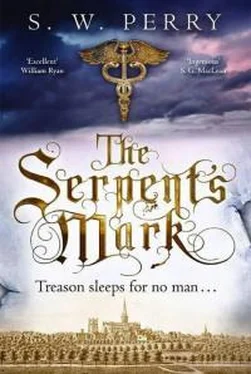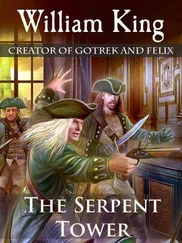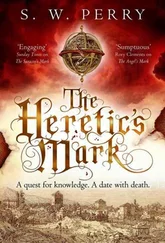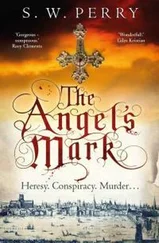‘That’s where the Spanish ball struck – the one that killed him,’ Tanner says in an awed voice, as if the patch is a holy relic.
‘That must have hurt,’ observes Finney.
Tanner Bell straightens and turns to face Finney again. ‘They sent the coat to my father, afterwards – didn’t fit him, either.’
‘And that’s why your father lost his wits: because of a coat?’
‘The coat was the last straw,’ says Tanner, wondering if all young players are as dull in the wits as Finney. ‘You see, Porter – my father – had gone to the Netherlands with Sir William in ’71. But Porter Bell wasn’t much of a soldier. He got caught, daft bugger – spent months as a captive of the Spaniards. Dorney’s death – June ’87 it was – was the very end of him. It was like the Devil just gathered up what the Dons had left of him the first time around and threw them on the midden.’
‘So he’s dead, is he – your father?’ asks Finney in a comradely tone. ‘Mine, too. Hanged for thieving a purse.’ He shrugs at the fickleness of fortune. ‘Would have got away with it, too, if he hadn’t chosen to rob the only magistrate in all twenty-six wards of London what could sprint more than ten paces after lunch.’
‘He’s not dead,’ says Tanner indignantly. ‘He’s in Gravesend.’
‘Have you ever played Gravesend?’ asks Finney.
‘It’s where he came from.’
‘Oh.’
‘When he became too ungovernable to stay at Havington Manor, Sir William set him up there, as a waterman. Even bought him his own wherry. That’s the sort of man Sir William was. I suppose I should have gone with him, but…’ Tanner’s voice trails off as he remembers the drunken blows, and the slurred protestations of regret that always followed. ‘Well, there was Samuel to look after, and I was always treated more like family than servant.’
‘Well, Gravesend or Cleevely – I know where I’d rather be.’
‘The theatre?’ says Tanner, knowing a little of Finney’s former life. ‘It might sound exciting. But sleeping on planks, and starving whenever the Lord Mayor chooses to shut the playhouses? At least here you get a mattress and fresh pottage.’ The habitual cheeriness returns to his puppyish face. ‘So stop griping about Samuel and his fits. Pick up those rods. There’s trout to catch – when he ’s ready.’
Finney looks at Samuel, kneeling in impenetrable contemplation on the grass, and then in the general direction of Cleevely House. ‘Alright, Tanner – let’s say you’re correct and Samuel isn’t possessed by the Devil when he has one of his fallings,’ he says, sounding unconvinced. ‘But now that Dr Arcampora has arrived, Samuel doesn’t have very far to crawl if he wants to be. Does he?’

The city Customs House, set back a little from the river to the east of Billingsgate, is built like a castle keep: a stern hexagonal tower on each corner, and a door like the entrance to a prison set menacingly into the façade on the right-hand side. Glancing at its dour brick face in the early-morning light as she hurries along the quayside the next morning, Bianca wonders why the English like to reward an honest merchant’s endeavours with such a forbidding welcome. She already knows the answer: because of seditious Catholic pamphlets secreted in sacks of ginger from the Indies; because of forbidden Masses hidden amongst bags of Baltic hemp; because of letters wrapped in oilcloth and hidden in casks of herring – letters from the continental Catholic seminaries to their agents in England.
She can spot the men from the High Court of Admiralty and the Privy Council searchers in the crowd, simply by the way they appear to have no employment except to scan the throng with suspicious eyes.
Bianca comes across the bridge infrequently now. She has little need to. She long ago whittled out the merchants who pass off crushed acorns and rowan berries as genuine spices from the Indies, and the purveyors of hoof-shavings who swear on their mother’s grave they’re selling real narwhal horn landed from the western ocean. Most of what she uses in her concoctions, distillations and infusions comes from the little patch of ground that is her physic garden, down by the river and known only to herself and Nicholas. The rest – the small measures of frankincense and fenugreek, the cerasee and cardamom – she gets in exchange for her balms and salves from those few importers she trusts.
Since she arrived in the city, little more than two years ago, she has noticed how London’s mood has changed. The people are not as tolerant to strangers as they once were. On the heels of the threatened Spanish invasion in ’88 has come a deepening wariness of foreigners. They are taxed more, stopped by the watchmen more often, railed against in church sermons and official proclamations. And although she has absorbed the peculiarities of her adopted country as best she can, Bianca – betrayed by her corona of richly dark hair and the warm hue of her skin as one who has grown up beneath the Veneto sun – stands out in a crowd like a falcon amongst a flock of seagulls.
But most of all she puts this hardening of attitude down to the fact that England’s queen is almost sixty. She could die soon, though even to suggest such a possibility in public is treason. Now people are beginning to consider the possibility that Philip of Spain – once married to Elizabeth’s half-sister Mary – may once again seek to claim his late wife’s dowry, this time by conquest rather than marriage.
On Bankside, none of this seems to matter so much. In the liberty of Southwark, where the Lord Mayor’s writ does not run, people appear much less concerned by matters of state and faith. The theatre, the bull- and bear-baiting pits, the stews and the taverns seem, to Bianca, a clearer echo of what England might once have been, before the new faith with all its godly rectitude got its hands on the rest of the land.
Her trip across the bridge today has a purely commercial motive. As foretold by Timothy, her taproom lad, the Sirena di Venezia has arrived, and Bianca is not about to let the Hanging Sword and other taverns along the wharves grab the profitable trade of thirty or more Venetian mariners with coin to spend – not when there’s the Jackdaw just a brief walk away on the other shore. Not when Bianca Merton can flash her vivid amber eyes and extol the attractions of Southwark fluently in her mother’s own tongue: Italian. She’s even brought with her a leather jug of her best knock-down to sway any doubters.
Making her way around the piles of shining Muscovy pelts, neat stands of ornate panelling from Saxony and ingots of Swedish iron, Bianca sees the Sirena lying a little way ahead. Just as Timothy had said, she’s the largest ship at the wharf: a fine four-masted carrack. Painted proudly on her high stern-castle is a winged lion: the emblem of Venice. On the quayside, a gang of stevedores is raising a rampart of sacks. Suddenly she hears someone calling to her in a clear, sharp voice that carries the dialect of the central Veneto.
‘ In nome dei santi benedetti! Bianca! ’
Turning, Bianca searches for a familiar face amongst the men clustered around the Customs House. And then she sees him, strutting towards her, head held high, all five feet three inches of him. A little Venetian cockerel of a man: Bruno Barrani, her cousin from Padua – champion of the Catholic faith, as handsome as Alexander.
Perhaps not Alexander, she concedes in the moment of recognition. The aquiline nose is softly blunted at the tip, robbing it of patrician force, and the delicately curled black moustache he wears above his bud-like lips – and which in Padua he sported like a knight’s banner – might be considered by some (especially the English) as a little preposterous. But still, he’s handsome enough. Clad almost entirely in black – black hose, black doublet, black half-cape – his only concessions to colour are the crimson-braided points securing his doublet and the gilt buckles on his shoes. Even his hair, worn extravagantly long, is black. Unnaturally so. Then she remembers: Bruno was always in the habit of applying a dye of sage and indigo to it. She feels the smile spread across her face like the heat from a good fire.
Читать дальше











